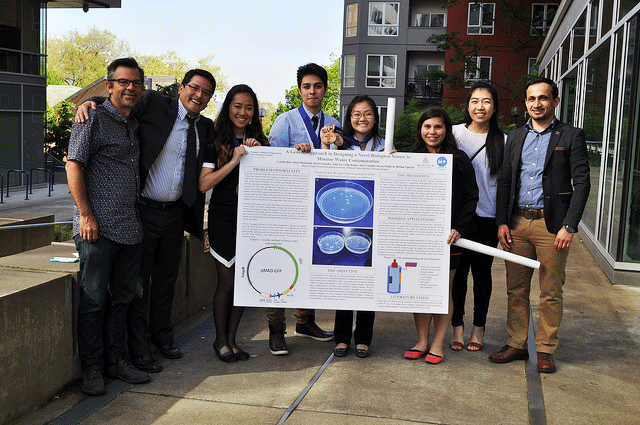Location
Portland State University
Start Date
4-11-2015 9:45 AM
End Date
4-11-2015 11:45 AM
Persistent Identifier
https://archives.pdx.edu/ds/psu/26366
Description
Goals: Our goals of this project was to:
- Obtain an energy efficient, self-sufficient system to help reduce waste and money, and reuse and recycle water. To have a successful, natural, and more self-sufficient filtration system, using algae.
- To use algae and other plants as an efficient way to filter water.
- To create a water filtration system that is organic and would have 0 waste.
- To use the water in the best and most efficient way possible, and to reduce energy and coal/oil consumption (water turbine)
- To make our community cleaner and greener, and reduce carbon footprint, pollution, and environmental impact.
When we started this project, our first thought was renewable energy. We wanted to create a self-sustaining urban habitat for Humans to live in. We eventually began to gravitate towards a more specific concept which would involve grey water treatment. While gray water is known to be used for in home appliances such as toilets, it's not really used to generate electricity. What we have created is a system that utilizes the kinetic energy of grey water to help power the system itself. The system includes both standard filters and a less common non-photosynthetic algae filter to allow better use of the recycled city rainwater.
If one spends time in our fine city, they will certainly notice the many old buildings around Portland. Though, they have majesty and charm flowing out of the rafters, they are also often inefficient in many regards. The other thing they will likely notice is the consistent downpour Portland has during the winter months, and even an occasional trickle during the summer months. The Peaceful Penguins team also manages to be this observant. We saw in our tours that many of the greener buildings in Portland make use of grey water run offs, i.e. rain, and recycle it for use around the facility. We aim to truly re-envision the way we think about grey water and it’s recycling.
Fieldwork Journal
Included in
Civil Engineering Commons, Engineering Education Commons, Environmental Engineering Commons
Osmosis Alive – Algae Water Filtration System
Portland State University
Goals: Our goals of this project was to:
- Obtain an energy efficient, self-sufficient system to help reduce waste and money, and reuse and recycle water. To have a successful, natural, and more self-sufficient filtration system, using algae.
- To use algae and other plants as an efficient way to filter water.
- To create a water filtration system that is organic and would have 0 waste.
- To use the water in the best and most efficient way possible, and to reduce energy and coal/oil consumption (water turbine)
- To make our community cleaner and greener, and reduce carbon footprint, pollution, and environmental impact.
When we started this project, our first thought was renewable energy. We wanted to create a self-sustaining urban habitat for Humans to live in. We eventually began to gravitate towards a more specific concept which would involve grey water treatment. While gray water is known to be used for in home appliances such as toilets, it's not really used to generate electricity. What we have created is a system that utilizes the kinetic energy of grey water to help power the system itself. The system includes both standard filters and a less common non-photosynthetic algae filter to allow better use of the recycled city rainwater.
If one spends time in our fine city, they will certainly notice the many old buildings around Portland. Though, they have majesty and charm flowing out of the rafters, they are also often inefficient in many regards. The other thing they will likely notice is the consistent downpour Portland has during the winter months, and even an occasional trickle during the summer months. The Peaceful Penguins team also manages to be this observant. We saw in our tours that many of the greener buildings in Portland make use of grey water run offs, i.e. rain, and recycle it for use around the facility. We aim to truly re-envision the way we think about grey water and it’s recycling.



Comments
Mentors: Susan Eslami, Anne Ng
Osmosis Alive – Algae Water Filtration System is licensed under the Creative Commons Attribution-NonCommercial 4.0 International License.